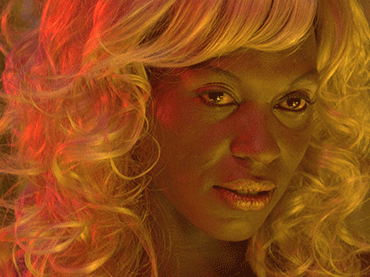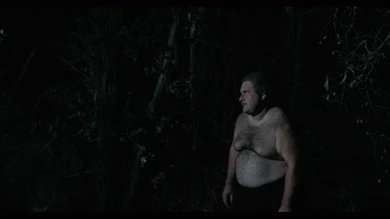-
Friday, 15 March 2019 – 7pm
Session 1
With a presentation by Albert Serra
Shuji Terayama
Emperor Tomato Ketchup
Japan, 1971, b/w, original version with Spanish subtitles, 35mm transferred to digital, 27’Koji Wakamatsu
The Embryo Hunts in Secret
Japan, 1966, b/w, original version with Spanish subtitles, 35mm transferred to digital, 73’’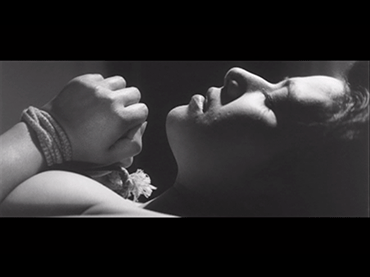
-
Wednesday, 20 March 2019 – 5pm
Session 2
Hans-Jürgen Syberberg
The Confessions of Winifred Wagner
Germany, 1977, b/w, original version with Spanish subtitles, 35mm transferred to digital, 302’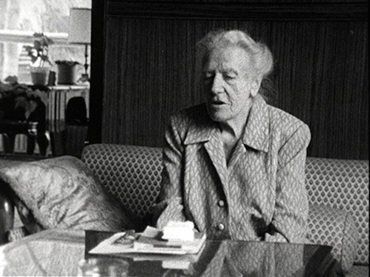
-
Friday, 29 March 2019 – 7pm
Session 3
Carolee Schneemann
Meat Joy
USA, 1964, colour, original version, 16mm transferred to digital, 5’Paul Morrissey
Flesh
USA, 1968, colour, original version with Spanish subtitles, 16mm transferred to digital, 89’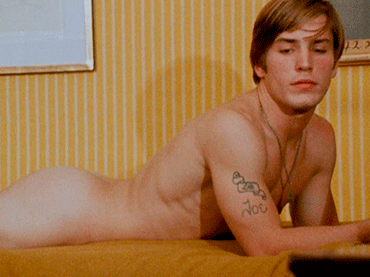
-
Friday, 5 April 2019 – 7pm
Session 4
-
Friday, 12 April 2019 – 7pm
Session 5
Ulrich Seidl
Models
Austria, 1999, colour, original version with Spanish subtitles, video, 118’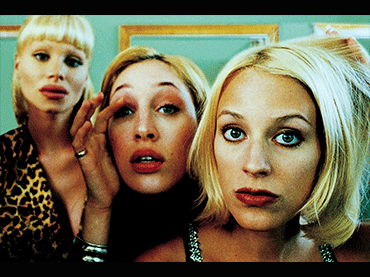

Held on 15, 20, 29 Mar, 05, 12 Apr 2019
In Me Too. Desire and Crime the Museo Reina Sofía invites Albert Serra to curate, for the first time in his career, a series of screenings which run alongside his new film installation, Personalien, made for the Museo’s Fissures programme. Serra’s voice is one of the most original in the reinvention of contemporary cinema, attested to by the Golden Leopard Award (Locarno, 2013), the Jean Vigo Award (2016), the Grand Prix Award at FIDMarseille (2018), and other prizes.
Across five sessions, the screened films allude to the film-maker’s cinematic references, developing a key theme in his recent films and audiovisual installations: the struggle between desire and morals, between emancipation and ethics, between impulse and duty, between a world of debauchery and other moral limits. Serra has approached this controversy in a cinematic history which transcends genre, becoming at once an allegory and emblem of the present, constituting an image of contemporaneity, for instance in the passage from illustration to Romanticism, in the encounter between Casanova and Dracula in Historia de mi muerte (The Story of My Death, 2013), in the slow and spurious demise of total power in La muerte de Luis XIV (The Death of Louis XIV, 2016) and Roi soleil (The Sun King, 2018), and, finally, in Personalien (2019), where sexual utopia in the twilight of the Ancien Régime at the end of the 18th century counters contemporary desire, articulated as a question of rights.
The series sees Albert Serra select different manifestations of desire in dark, varied episodes in the history of cinema, from the Japanese underground or Warhol’s Factory and entourage in late 1968 to post-dramatic and performative cinema by contemporary film-makers such as João Pedro Rodrigues and Ulrich Seidl. This journey, assembled as “cruising between images and impulses,” in the words of the film-maker, is an approach to desire understood as totalitarian power, psychological liberation through the uses of the body, social emancipation during counterculture and an outwardly fetishist and perverse dictatorship.
The title of the series refers to the Me Too movement and the moral involvement of the spectator’s gaze, while the subheading alludes to a key manifesto of modernity, Ornament and Crime (1908), in which the architect Adolf Loos identifies functionalism or structure with virtue, while decoration, the ‘flesh’ of architecture, is the voluptuous element and thus superfluous and criminal. Furthermore, upon choosing films that seek transgression, Serra pays homage to Amos Vogel’s book Film as Subversive Art (1974) – he also wrote a foreword in the French reprint (Capricci, 2016) – a cult essay on avant-garde film.
Curatorship
Albert Serra
Organised by
Museo Reina Sofía
Más actividades

Aesthetics of Peace and Desertion Tactics
8 October 2025 – 24 June 2026
The study group Aesthetics of Peace and Tactics of Desertion: Prefiguring New Pacifisms and Forms of Transitional Justice proposes a rethinking—through both a theoretical-critical and historical-artistic lens—of the intricate network of concepts and practices operating under the notion of pacifism. A term not without contestation and critical tension, pacifism gathers under its name a multiplicity of practices—from anti-militarism and anti-war movements to non-violence activism—while simultaneously opening urgent debates around violence, justice, reparation, and desertion. Here, pacifism is not conceived as a moral doctrine, but as an active form of ethical and political resistance capable of generating aesthetic languages and new positions of social imagination.
Through collective study, the group seeks to update critical debates surrounding the use of violence and non-violence, as well as to explore the conflict of their representation at the core of visual cultures. In a present marked by rearmament, war, genocide, and the collapse of the social contract, this group aims to equip itself with tools to, on one hand, map genealogies and aesthetics of peace—within and beyond the Spanish context—and, on the other, analyze strategies of pacification that have served to neutralize the critical power of peace struggles. Transitional and anti-punitive justice proposals will also be addressed, alongside their intersections with artistic, visual, and cinematic practices. This includes examining historical examples of tribunals and paralegal activisms initiated by artists, and projects where gestures, imaginaries, and vocabularies tied to justice, reparation, memory, and mourning are developed.
It is also crucial to note that the study programme is grounded in ongoing reflection around tactics and concepts drawn, among others, from contemporary and radical Black thought—such as flight, exodus, abolitionism, desertion, and refusal. In other words, strategies and ideas that articulate ways of withdrawing from the mandates of institutions or violent paradigms that must be abandoned or dismantled. From feminist, internationalist, and decolonial perspectives, these concepts have nourished cultural coalitions and positions whose recovery today is urgent in order to prefigure a new pacifism: generative, transformative, and radical.
Aesthetics of Peace and Tactics of Desertion, developed and led by the Museo Reina Sofía’s Studies Management, unfolds through biweekly sessions from October to June. These sessions alternate between theoretical discussions, screenings, work with artworks and archival materials from the Museo’s Collection, reading workshops, and public sessions. The group is structured around sustained methodologies of study, close reading, and collective discussion of thinkers such as Judith Butler, Elsa Dorlin, Juan Albarrán, Rita Segato, Sven Lütticken, Ruth Wilson Gilmore, and Franco “Bifo” Berardi; historical episodes such as the anti-nuclear and anti-arms race movement in Spain; and the work of artists and activists including Rojava Film Commune, Manuel Correa and the Oficina de Investigación Documental (Office for Documentary Investigation), and Jonas Staal, among other initial cases that will expand as the group progresses.

Institutional Decentralisation
Thursday, 21 May 2026 – 5:30pm
This series is organised by equipoMotor, a group of teenagers, young people and older people who have participated in the Museo Reina Sofía’s previous community education projects, and is structured around four themed blocks that pivot on the monstrous.
This fourth and final session centres on films that take the museum away from its axis and make it gaze from the edges. Pieces that work with that which is normally left out: peripheral territories, unpolished aesthetics, clumsy gestures full of intent. Instead of possessing an institutional lustre, here they are rough, precarious and strange in appearance, legitimate forms of making and showing culture. The idea is to think about what happens when central authority is displaced, when the ugly and the uncomfortable are not hidden, when they are recognised as part of the commons. Film that does not seek to be to one’s liking, but to open space and allow other ways of seeing and inhabiting the museum to enter stage.

Intergenerationality
Thursday, 9 April 2026 – 5:30pm
This series is organised by equipoMotor, a group of teenagers, young people and older people who have participated in the Museo Reina Sofía’s previous community education projects, and is structured around four themed blocks that pivot on the monstrous.
The third session gazes at film as a place from which to dismantle the idea of one sole history and one sole time. From a decolonial and queer perspective, it explores films which break the straight line of past-present-future, which mix memories, slow progress and leave space for rhythms which customarily make no room for official accounts. Here the images open cracks through which bodies, voices and affects appear, disrupting archive and questioning who narrates, and from where and for whom. The proposal is at once simple and ambitious: use film to imagine other modes of remembering, belonging and projecting futures we have not yet been able to live.

Remedios Zafra
Thursday March 19, 2026 - 19:00 h
The José Luis Brea Chair, dedicated to reflecting on the image and the epistemology of visuality in contemporary culture, opens its program with an inaugural lecture by essayist and thinker Remedios Zafra.
“That the contemporary antifeminist upsurge is constructed as an anti-intellectual drive is no coincidence; the two feed into one another. To advance a reactionary discourse that defends inequality, it is necessary to challenge gender studies and gender-equality policies, but also to devalue the very foundations of knowledge in which these have been most intensely developed over recent decades—while also undermining their institutional support: universities, art and research centers, and academic culture.
Feminism has been deeply linked to the affirmation of the most committed humanist thought. Periods of enlightenment and moments of transition toward more just social forms—sustained by education—have been when feminist demands have emerged most strongly. Awareness and achievements in equality increase when education plays a leading social role; thus, devaluing intellectual work also contributes to harming feminism, and vice versa, insofar as the bond between knowledge and feminism is not only conceptual and historical, but also intimate and political.
Today, antifeminism is used globally as the symbolic adhesive of far-right movements, in parallel with the devaluation of forms of knowledge emerging from the university and from science—mistreated by hoaxes and disinformation on social networks and through the spectacularization of life mediated by screens. These are consequences bound up with the primacy of a scopic value that for some time has been denigrating thought and positioning what is most seen as what is most valuable within the normalized mediation of technology. This inertia coexists with techno-libertarian proclamations that reactivate a patriarchy that uses the resentment of many men as a seductive and cohesive force to preserve and inflame privileges in the new world as techno-scenario.
This lecture will address this epochal context, delving into the synchronicity of these upsurges through an additional parallel between forms of patriarchal domination and techno-labor domination. A parallel in which feminism and intellectual work are both being harmed, while also sending signals that in both lie emancipatory responses to today’s reactionary turns and the neutralization of critique. This consonance would also speak to how the perverse patriarchal basis that turns women into sustainers of their own subordination finds its equivalent in the encouraged self-exploitation of cultural workers; in the legitimation of affective capital and symbolic capital as sufficient forms of payment; in the blurring of boundaries between life and work and in domestic isolation; or in the pressure to please and comply as an extended patriarchal form—today linked to the feigned enthusiasm of precarious workers, but also to technological adulation. In response to possible resistance and intellectual action, patriarchy has associated feminists with a future foretold as unhappy for them, equating “thought and consciousness” with unhappiness—where these have in fact been (and continue to be) levers of autonomy and emancipation.”
— Remedios Zafra

27th Contemporary Art Conservation Conference
Wednesday, 4, and Thursday, 5 March 2026
The 27th Contemporary Art Conservation Conference, organised by the Museo Reina Sofía’s Department of Conservation and Restoration, with the sponsorship of the Mapfre Foundation, is held on 4 and 5 March 2026. This international encounter sets out to share and debate experience and research, open new channels of study and reflect on conservation and the professional practice of restorers.
This edition will be held with in-person and online attendance formats, occurring simultaneously, via twenty-minute interventions followed by a five-minute Q&A.
